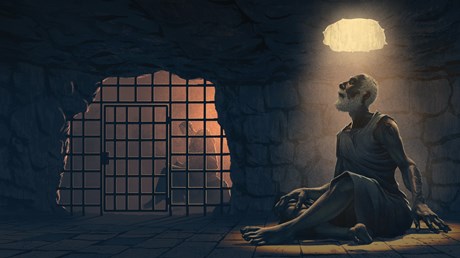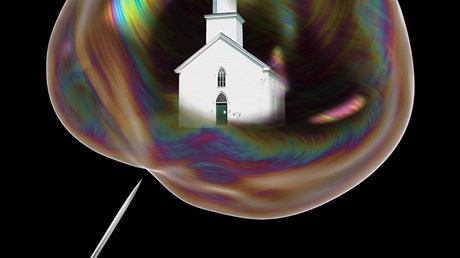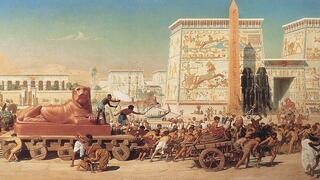Search Results for scholar
Links
Baptist Studies Online is dedicated to the study of Baptist history and thought, with special emphasis on Baptists in North America.
|
Christian Classics Ethereal Library
|
Douglasville Georgia (GA)
|
Bridging the gap between Sunday school and seminary
|
Articles
By Morey
|
Videos
News
The surprising argument that Saul of Tarsus was born into bondage.
 Of the many letters the apostle Paul wrote, few survived. We have a good deal of his communication to churches as a whole—letters to groups of believers in particular cities. This makes sense. Such letters were read publicly and often; they were copied and disseminated and celebrated as Scripture soon after the ink had dried.Paul sent a number of letters to individuals as well. To read his biblical writings is to sense that you are glimpsing only a fraction of his relational network and influence. Almost all of those letters have been lost.But there are exceptions.It was a tall order for personal letters to ascend to the level of canon. It helped to be bound up with a great figure, a leader of a great community. Timothy, for instance, was a towering second-generation church leader; he was also the bishop of Ephesus, a major city of the Roman Empire and a major Christian center. Titus was a pillar of the Gentile mission and served as the bishop of Crete. Their eponymous letters had huge communities to champion their inclusion in Scripture.A mystery for the ages, then, is why Paul’s letter to Philemon—the leader of a house church in the minor city of Colossae—survives at all. It’s the most personal letter we have from Paul. It runs only 25 verses.The letter reveals a story. In it, a man named Onesimus has fled his master Philemon. Onesimus was most likely a household slave, a bondservant high in the pecking order.To call him a runaway slave is true, though it is misleading for modern readers, who might imagine Onesimus attempting to escape through something like the Underground Railroad.In fact, some scholars argue that Onesimus sought out Paul but planned to return to his master. Steven M. Baugh, ...Continue reading... Of the many letters the apostle Paul wrote, few survived. We have a good deal of his communication to churches as a whole—letters to groups of believers in particular cities. This makes sense. Such letters were read publicly and often; they were copied and disseminated and celebrated as Scripture soon after the ink had dried.Paul sent a number of letters to individuals as well. To read his biblical writings is to sense that you are glimpsing only a fraction of his relational network and influence. Almost all of those letters have been lost.But there are exceptions.It was a tall order for personal letters to ascend to the level of canon. It helped to be bound up with a great figure, a leader of a great community. Timothy, for instance, was a towering second-generation church leader; he was also the bishop of Ephesus, a major city of the Roman Empire and a major Christian center. Titus was a pillar of the Gentile mission and served as the bishop of Crete. Their eponymous letters had huge communities to champion their inclusion in Scripture.A mystery for the ages, then, is why Paul’s letter to Philemon—the leader of a house church in the minor city of Colossae—survives at all. It’s the most personal letter we have from Paul. It runs only 25 verses.The letter reveals a story. In it, a man named Onesimus has fled his master Philemon. Onesimus was most likely a household slave, a bondservant high in the pecking order.To call him a runaway slave is true, though it is misleading for modern readers, who might imagine Onesimus attempting to escape through something like the Underground Railroad.In fact, some scholars argue that Onesimus sought out Paul but planned to return to his master. Steven M. Baugh, ...Continue reading... |
NIL deals in college athletics present new challenges—and opportunities—for colleges and students.
 When Deverin Muff played Division I college basketball at Eastern Kentucky University, student athletes weren’t allowed to earn money off their name, image, and likeness (NIL)—their personal brand.Now he’s a professor at the university, and some of the players in his classes have agents. An NCAA policy change in 2021—heralded by Muff and other Christian athletes as a matter of fairness—allows college athletes to earn money beyond financial aid or scholarships.“This is a matter of justice, frankly. … It righted a historic wrong,” said Pepperdine University sports administration professor Alicia Jessop. College sports, especially football and basketball, draw in billions in revenue.Christians in college athletics have welcomed the change to allow NIL deals, according to interviews with CT. But they are also navigating an unknown landscape and finding challenges along the way. The NCAA itself is still reeling from the resulting shifts in the economics of college sports, passing additional NIL rules just last week.Jessop was recently teaching a class on NIL deals at Pepperdine, where she is also the faculty representative to the NCAA. One student decided to put the class into practice immediately and reached out to a sunglasses brand to pitch a deal. In a short time, the student had a free pair of sunglasses delivered.“It’s a teaching tool,” said Jessop. “They think they’re learning about NIL so they’re focused, but they’re getting a whole business curriculum put in front of them.”Under the new NCAA rules passed last week, schools can be more directly involved in NIL deals and they can offer a support system that helps educate students ...Continue reading... When Deverin Muff played Division I college basketball at Eastern Kentucky University, student athletes weren’t allowed to earn money off their name, image, and likeness (NIL)—their personal brand.Now he’s a professor at the university, and some of the players in his classes have agents. An NCAA policy change in 2021—heralded by Muff and other Christian athletes as a matter of fairness—allows college athletes to earn money beyond financial aid or scholarships.“This is a matter of justice, frankly. … It righted a historic wrong,” said Pepperdine University sports administration professor Alicia Jessop. College sports, especially football and basketball, draw in billions in revenue.Christians in college athletics have welcomed the change to allow NIL deals, according to interviews with CT. But they are also navigating an unknown landscape and finding challenges along the way. The NCAA itself is still reeling from the resulting shifts in the economics of college sports, passing additional NIL rules just last week.Jessop was recently teaching a class on NIL deals at Pepperdine, where she is also the faculty representative to the NCAA. One student decided to put the class into practice immediately and reached out to a sunglasses brand to pitch a deal. In a short time, the student had a free pair of sunglasses delivered.“It’s a teaching tool,” said Jessop. “They think they’re learning about NIL so they’re focused, but they’re getting a whole business curriculum put in front of them.”Under the new NCAA rules passed last week, schools can be more directly involved in NIL deals and they can offer a support system that helps educate students ...Continue reading... |
Let us not give up meeting together—even when we disagree.
 Recently, a woman at my church approached me with a question borne out of genuine curiosity. She asked, “You’re a female theologian. Why did you choose to come to our church when women aren’t allowed to preach here?”Since much of my work as a Bible scholar is public, it is no secret that I support women’s full participation in ministry, including in church leadership. So I wasn’t surprised that someone happened to notice my convictions did not match our church’s practice on this issue.It’s a good question, and one I’ve wrestled with regularly—since, at present, I don’t feel I’m able to serve our church in all the ways that God has called and equipped me. I so long for the body of Christ to embrace the gifts of all its members, not only here but around the world. But as CT’s April issue reminds us, the global church is far from united on what women can and can’t do in church.Still, I was glad my friend asked me about our family’s decision-making process, because it’s face-to-face conversations like this that prevent polarization. The role of women isn’t the only issue that divides us today. Approaches to racial reconciliation or diversity initiatives, our posture toward climate change, and politics—particularly when there’s another contentious presidential election in sight—are all areas that threaten to fracture our faith communities.According to The Great Dechurching, a recent book by Jim Davis, Michael Graham, and Ryan P. Burge, people are leaving the church in unprecedented numbers. Forty million Americans who used to attend church no longer do—that’s 16 percent ...Continue reading... Recently, a woman at my church approached me with a question borne out of genuine curiosity. She asked, “You’re a female theologian. Why did you choose to come to our church when women aren’t allowed to preach here?”Since much of my work as a Bible scholar is public, it is no secret that I support women’s full participation in ministry, including in church leadership. So I wasn’t surprised that someone happened to notice my convictions did not match our church’s practice on this issue.It’s a good question, and one I’ve wrestled with regularly—since, at present, I don’t feel I’m able to serve our church in all the ways that God has called and equipped me. I so long for the body of Christ to embrace the gifts of all its members, not only here but around the world. But as CT’s April issue reminds us, the global church is far from united on what women can and can’t do in church.Still, I was glad my friend asked me about our family’s decision-making process, because it’s face-to-face conversations like this that prevent polarization. The role of women isn’t the only issue that divides us today. Approaches to racial reconciliation or diversity initiatives, our posture toward climate change, and politics—particularly when there’s another contentious presidential election in sight—are all areas that threaten to fracture our faith communities.According to The Great Dechurching, a recent book by Jim Davis, Michael Graham, and Ryan P. Burge, people are leaving the church in unprecedented numbers. Forty million Americans who used to attend church no longer do—that’s 16 percent ...Continue reading... |
The world is realizing anew that our faith has tangible benefits. This is an opportunity for the gospel.
 As Christianity continues to decline in the West, the broader world has begun to notice something’s missing. There seems to be a growing awareness that—for all the scandals and failings of the church—the loss of a Christian culture leaves us all worse off, and that there are benefits to being a Christian and to living in a Christian society.For example, Derek Thompson recently wrote in The Atlantic about the loss of community that comes with declining church attendance. “Maybe religion, for all of its faults, works a bit like a retaining wall,” he concluded, “hold[ing] back the destabilizing pressure of American hyper-individualism, which threatens to swell and spill over in its absence.”Likewise, Harvard scholar Tyler J. VanderWeele has extensively researched the benefits of participation in religious services, finding that it leads to improved mental and physical health, happiness, and sense of meaning. Statistically, going to church regularly will help you flourish as a human being. As Brad Wilcox, a professor at the University of Virginia, has shown, regular church attendance even correlates with a more satisfying sex life!And then you have those like former atheist Ayaan Hirsi Ali who explain their conversion to Christianity at least partly as a response to the decay of the contemporary world, a world threatened by “woke ideology,” “global Islam,” and authoritarianism. “The only credible answer, I believe, lies in our desire to uphold the legacy of the Judeo-Christian tradition,” Hirsi Ali said in an essay announcing her new faith. Famous atheist Richard Dawkins objected to Hirsi Ali’s conversion yet seems to ...Continue reading... As Christianity continues to decline in the West, the broader world has begun to notice something’s missing. There seems to be a growing awareness that—for all the scandals and failings of the church—the loss of a Christian culture leaves us all worse off, and that there are benefits to being a Christian and to living in a Christian society.For example, Derek Thompson recently wrote in The Atlantic about the loss of community that comes with declining church attendance. “Maybe religion, for all of its faults, works a bit like a retaining wall,” he concluded, “hold[ing] back the destabilizing pressure of American hyper-individualism, which threatens to swell and spill over in its absence.”Likewise, Harvard scholar Tyler J. VanderWeele has extensively researched the benefits of participation in religious services, finding that it leads to improved mental and physical health, happiness, and sense of meaning. Statistically, going to church regularly will help you flourish as a human being. As Brad Wilcox, a professor at the University of Virginia, has shown, regular church attendance even correlates with a more satisfying sex life!And then you have those like former atheist Ayaan Hirsi Ali who explain their conversion to Christianity at least partly as a response to the decay of the contemporary world, a world threatened by “woke ideology,” “global Islam,” and authoritarianism. “The only credible answer, I believe, lies in our desire to uphold the legacy of the Judeo-Christian tradition,” Hirsi Ali said in an essay announcing her new faith. Famous atheist Richard Dawkins objected to Hirsi Ali’s conversion yet seems to ...Continue reading... |
 Available ancient Egyptian sources don't mention events documented in the Haggadah, or even specific names like that of the star of the Passover story, Moses, says Israeli scholar. So what can we glean from the scarce historical record of ancient Israelites in the Nile Delta? Available ancient Egyptian sources don't mention events documented in the Haggadah, or even specific names like that of the star of the Passover story, Moses, says Israeli scholar. So what can we glean from the scarce historical record of ancient Israelites in the Nile Delta? |



 Links
Links  Articles
Articles  Blogs
Blogs  Videos
Videos  News
News  Colors
Colors 

 New links
New links






